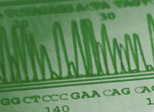 |
Dr. Ronald JW Lambert
Cranfield University, Reader in Applied Microbiology, Vincent Building
Project: Modelling the growth of Alicyclobacillus acidoterrestris with respect to inoculum size, temperature, K sorbate and pH.
|
 |
 |
 |
Aims of the study: To investigate and model the effect of combined pH (2.5 to 4), and potassium sorbate (0- 800 mg l-1) against an industrial isolate of Alicyclobacillus acidoterrestris and the type strain (ATCC 49025). Methods and Results. Time to detection data were obtained using a Bioscreen Microbiological Analyser and modelled using the Extended Lambert-Pearson Model. Growth rates of the type strain were faster than that of the industrial isolate, but were consistent with a general model with an optimum growth temperature of 45-50oC. The minimum pH for growth was pH 2.1-2.3, in the absence of weak acid. Sorbic acid had a calculated MIC = 280 mg l-1 for both the factory isolate and the type strain. Conclusions: The model suggests that pH and K sorbate inhibit independently and that a pH above the pH minimum can be compensated by the addition of K sorbate to maintain the organism in a no-growth state. Significance and Impact of the study. Members of the genus Alicyclobacillus, particularly the species A. acidoterrestris pose a direct threat to the beverage industry: their spores can survive pasteurisation and can be stimulated to germinate. This initial study gives us a foundation for the examination of growth in real beverages, (e.g. combining the pH and sorbate models with inoculum size and temperature) to allow a shelf-life estimate based on likely contamination levels.
Website: http://www.cranfield.ac.uk/about/people-and-resources/academic-profiles/seea-ac-profile/dr-ronnie-rjw-lambert.html
|
|



